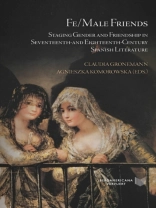Although the traditions of philia and amicitia proclaim friendship as a universal concept, it has been an androcentric model until the emergence of the female friend in the Age of Enlightenment. This book analyzes the discursive turn from premodern to modern gendered constructions of friends in Spanish literature and sheds light on specific models of male, female, and mixed relationships in the seventeenth and eighteenth century. Our approach reveals the gendering of male friendship through the exclusion of women and shows the crucial moment when women appear capable of true friendship. The study traces the process of transition from a homosocial bond based on a feudal notion of honor in the Siglo de Oro to new forms of affective relations in a proto-bourgeois society that promotes equality, reason and citizenship. This book spans two centuries of friendship and scrutinizes the creation of specifically gendered social bonds in literary and theoretical frameworks ranging from political writing to poetry, and from the working classes to the intellectual elites. Through novellas, novels, plays, poems, moral weeklies, and letters by female and male authors, every chapter examines a specific concept of fe/male friends related to society, politics, ethics, subjectivity, courtly culture, family and marriage structures. Thus, the book demonstrates the very act of gendering as it relates to friendship as one of the most important forms of social interaction.
Claudia Gronemann & Agnieszka Komorowska
Fe/Male Friends [EPUB ebook]
Staging Gender and Friendship in Seventeenth- and Eighteenth-Century Spanish Literature
Fe/Male Friends [EPUB ebook]
Staging Gender and Friendship in Seventeenth- and Eighteenth-Century Spanish Literature
Dieses Ebook kaufen – und ein weitere GRATIS erhalten!
Sprache Englisch ● Format EPUB ● Seiten 270 ● ISBN 9783968694283 ● Herausgeber Claudia Gronemann & Agnieszka Komorowska ● Verlag Iberoamericana Vervuert ● Erscheinungsjahr 2023 ● herunterladbar 3 mal ● Währung EUR ● ID 9320488 ● Kopierschutz Adobe DRM
erfordert DRM-fähige Lesetechnologie












